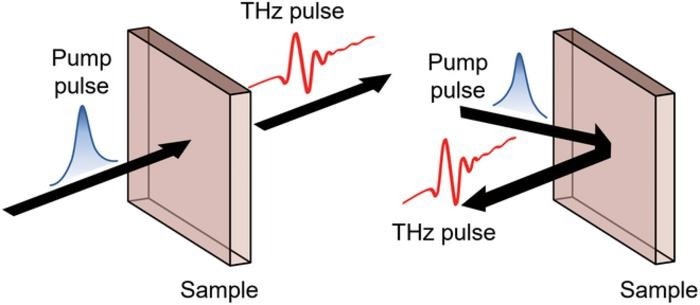A review article on terahertz (THz) radiation in quantum materials has been published by researchers at the University of Electronic Science and Technology of China.
 The schematic diagram shows the transmission mode (left) and reflection mode (right) of THz emission. Image Credit: Ultrafast Science
The schematic diagram shows the transmission mode (left) and reflection mode (right) of THz emission. Image Credit: Ultrafast Science
The study was headed by Surui Yang, Liang Cheng, and Jingbo Qi. Their work investigates the time-dependent photocurrents, illuminating the most recent understanding of the underlying physical processes.
The research, carried out at the cutting edge of ultrafast science, explores how THz radiation may be used to reveal the underlying physics of quantum materials and how this might affect the creation of new technologies. The review is centered on recent developments using THz emission spectroscopy to unveil the special characteristics of quantum materials.
Introduction: Decoding Terahertz Emission
The release of electromagnetic radiation in the THz range, known as terahertz emission, has gained significant attention in research because of its possible uses in various industries, such as spectroscopy, imaging, sensing, and communications. The THz frequency range provides a wavelength range of roughly 0.03 to 3 mm from 0.1 to 10 THz.
The study investigates several mechanisms underlying THz emission in conductors, insulators, and semiconductors. Various factors influence THz emission characteristics, including device fabrication, magnetic moments, carrier dynamics, and electronic structure. Technological developments and identifying novel materials with special qualities have increased the opportunities for THz emission research. The review highlights the increasing attention that THz emission and its possible applications in various fields are receiving.
Unraveling Quantum Materials Through THz Emission
The review focuses on the properties of quantum materials that defy classical physics and highlights the investigation of THz emission in these materials. Ultrafast photocurrent causing THz emission is observed under femtosecond pulsed laser excitation in materials exhibiting ferroelectricity, superconductivity, and topological nontrivial band structures.
Understanding THz emission from quantum materials requires understanding the interplay between spin-related excitation, lattice vibrations, and charge carriers. Investigating THz emission helps uncover fundamental physical processes, which advances the creation of novel techniques for working with quantum materials.
Focus on Topological Materials and Strongly Correlated Systems
The review explores the latest advancements in THz emission in two categories of quantum materials: strongly correlated systems and topological materials. Particular focus is on semimetals (Dirac and Weyl) and topological insulators in topological materials, as well as multiferroics and superconductors in strongly correlated systems.
Finally, the researchers hope to stimulate more research in this fascinating and quickly expanding field. The review lays the groundwork for future investigations into the complex interactions between terahertz radiation and quantum materials as theoretical interpretations of new experimental results develop.
Journal Reference:
Yang, S., et al. (2024)Terahertz Emission in Quantum Materials. Ultrafast Science. doi.org/10.34133/ultrafastscience.0047